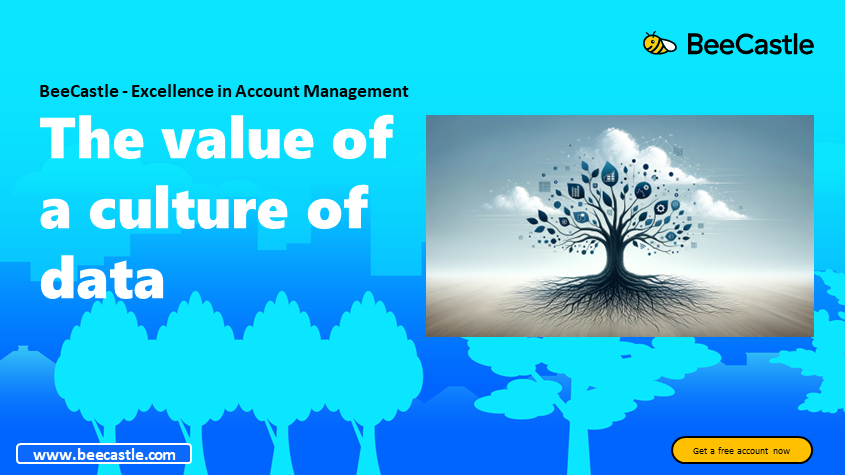

Embracing a Culture of Data for Business Transformation
In the landscape of modern business, data reigns supreme. Yet, the true value of data isn’t in its collection but in its application. BeeCastle’s methodology shines a light on this very principle: cultivating a culture of data is integral to driving business success.
A Culture of Data is a Culture of Clarity A culture of data transcends the mere use of data—it involves a mindset where every decision is influenced by insights derived from data. BeeCastle presents a blueprint for integrating data into the daily rhythms of business.

Account Management: Activities, Frequency and Tools
To foster this culture of data your organisation can implement a number of different activities with varying frequencies. BeeCastle provides tools that help with each of these activities:
- Plan and Track Engagement: By keeping a pulse on client interactions daily, businesses can ensure that no client is neglected and every opportunity for engagement is utilized. BeeCastle’s engagement summary dashboards make tracking client engagement easy.
- Meetings Management: Another daily activity is to plan for your upcoming meetings and review which clients need to be met with. BeeCastle’s meeting planner feature simplifies organizing and preparing for meetings, enabling teams to come equipped with data-driven insights.
- Opportunity Management: Identifying opportunities for up-sell and cross-sell is a weekly activity for which BeeCastle provides a number of tools including our whitespace prospecting dashboards and open opportunties dashboard.
- Sales Team Meeting: Your sales team meetings, which can be performed weekly or monthly, should track the current progress of your sales pipeline. Visualise this data using our sales dashboard.
- Quarterly Business Reviews: Conducting in-depth reviews every quarter is an essential practice to evaluate broader business performance trends and make strategic adjustments. These sessions are pivotal in aligning team objectives with overall company goals, understanding market dynamics, and recalibrating for the coming quarter.
- Account Performance Review & Territory Planning: Territory planning and account performance reviews are typically conducted on a quarterly to yearly basis. These activities involve evaluating sales performance, identifying areas for expansion, and setting territory-specific objectives. To assist in these high-level strategies, BeeCastle offers detailed customer tiering and revenue history tools, which support a data-driven approach to territory management. Moreover, the customer profitability analysis functionality allows businesses to make informed decisions about where to focus their efforts for maximum impact. By leveraging these tools, organizations can optimize their market coverage and focus on the most lucrative opportunities, laying a solid foundation for sustained growth and success.
Leadership’s Role: Catalysts for a Data-Driven Shift
Leadership must take the helm in this cultural shift. By mandating regular meetings around data, utilizing evidence-based language, and setting KPIs tied to data insights, leaders can embed a data-first ethos within the organization.
The Value Multiplier: Data in Decision-Making
As BeeCastle suggests, the cumulative effect of daily data usage is monumental. Each interaction tracked, each opportunity identified, and each trend analyzed contributes to a compound effect that heightens the organization’s ability to make strategic, informed decisions.
Conclusion: Data as the New Currency of Business Success
The value of a data-centric culture is immeasurable. It’s about more than just numbers; it’s about fostering an environment where data informs growth, efficiency, and innovation. BeeCastle’s methodology is not just a tool; it’s a transformational force that can propel businesses into new realms of performance and profitability.
By adopting these practices, businesses can ensure they’re not just surviving in a data-driven world—they’re thriving, leading, and redefining what it means to be truly data-driven.